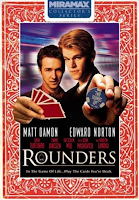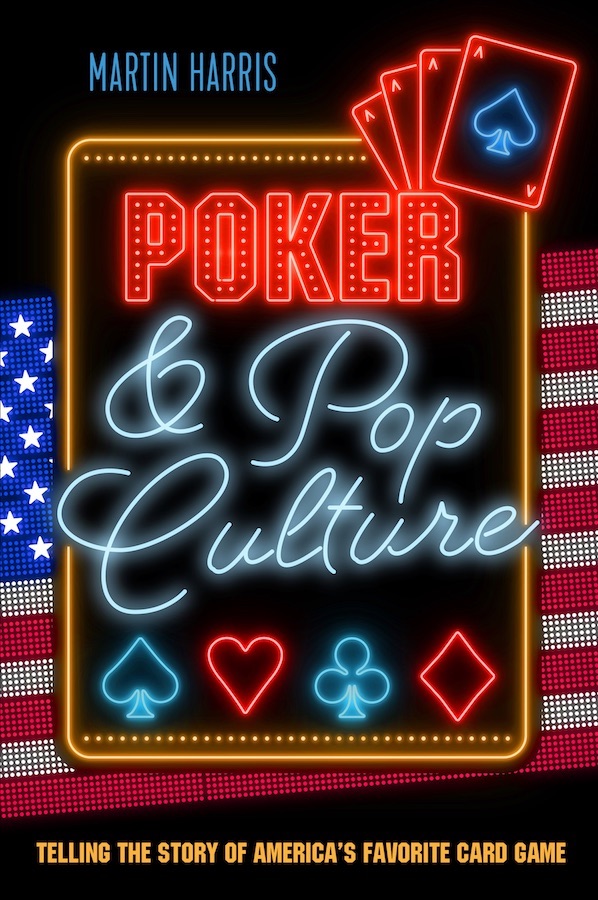Reflecting on Rounders
 Crazy busy today. Later on this evening I’ll be flying to Peru where I’ll be helping Dr. Pauly cover the LAPT event happening there this week for the PokerStars blog. It’s a return trip for me, in fact, as I was there last June, the last time the tour touched down on the west coast of South America at Lima. That was the event in which Jose “Nacho” Barbero won his second straight LAPT title.
Crazy busy today. Later on this evening I’ll be flying to Peru where I’ll be helping Dr. Pauly cover the LAPT event happening there this week for the PokerStars blog. It’s a return trip for me, in fact, as I was there last June, the last time the tour touched down on the west coast of South America at Lima. That was the event in which Jose “Nacho” Barbero won his second straight LAPT title. As a result, I have been taking care of various tasks before I go, among them finishing up the film unit in my “Poker in American Film and Culture” class before giving them a short break here prior to semester’s end.
Yesterday in class we discussed the last of our scheduled films, Rounders (1998). I included Rounders among our required viewings mostly because having shown a couple of older films (The Cincinnati Kid [1965] and California Split [1974]), I wanted to provide a bit of contrast by showing something relatively contemporary. I also thought the students would probably enjoy Rounders more than the older films, which indeed turned out to be the case.
I know for some of the students they were simply glad finally to see some hold’em on screen. And I’m sure there were those among them who preferred the more familiar-seeming vibe of the production, at least when compared to something like Robert Altman’s much more challenging (even experimental) California Split.
 In fact, at one point in our discussion I pointed out that it was likely the case that a lot of poker on TV that has been produced since Rounders was probably influenced in certain ways by the way the poker is shown in the film. I don’t think this claim is too much of a stretch, really, and perhaps further underscores the historical importance of the movie as one that not only influenced a lot of players, but also the producers of televised poker over the last decade-plus.
In fact, at one point in our discussion I pointed out that it was likely the case that a lot of poker on TV that has been produced since Rounders was probably influenced in certain ways by the way the poker is shown in the film. I don’t think this claim is too much of a stretch, really, and perhaps further underscores the historical importance of the movie as one that not only influenced a lot of players, but also the producers of televised poker over the last decade-plus.That said, I’ve always been kind of lukewarm about Rounders, a film that includes several strong elements, but also a lot of weaknesses that tend to keep me from championing it too much as a either cinematic achievement in general or a “great poker movie” in particular.
I don’t have time today to spell out all of the problems I have with the movie, although I suppose I could collect them all under the general heading of “inconsistency” of which I think there are multiple varieties present in Rounders.
One is an inconsistency with reality, that is, the extent to which we are intended to understand the movie to be “realistic.” If you’ve seen the film, you know what I’m talking about -- those head-scratcher plot turns or character decisions that seem to beggar belief.
In class I alluded to one of my favorite examples of such improbability when I told the students if they ever thought about asking me for a loan of $15,000 (as Mike McDermott does his professor in the film), I could save them the trouble. (We shared a good chuckle over that.)
But there are also what might be called “internal” inconsistencies that exist within the world of the film -- that is, elements within the film which seem self-contradictory (never mind the degree to which they seem probable or not). And to me such problems tend to make Rounders less of an achievement when compared to the other films we watched.
 Just to give one example, we all remember the argument Mike has with Jo on the street about how poker is not, in his opinion, to be regarded as “gambling” but rather a “skill game.”
Just to give one example, we all remember the argument Mike has with Jo on the street about how poker is not, in his opinion, to be regarded as “gambling” but rather a “skill game.” Poker players love this scene, in which Mike makes the case for the legitimacy of the pursuit. “Why do you think the same five guys make it to the final table of the World Series of Poker every single year,” Mike says, exaggerating just a tad but we get his point. “What, are they the luckiest guys in Las Vegas?”
No, obviously they aren’t. Luck matters, but long-term success in poker requires skill, for sure. You tell her, Mike!
Why are they arguing in the first place? Because Mike -- after having previously sworn off poker as if it were a drug habit or some other ungodly vice -- had gone to play in a game with his buddy Worm, lied about doing so to Jo, and now is trying to defend his actions. He’s arguing that she’s mistaken to think poker is gambling, that it isn’t as morally objectionable as she seems to believe.
But wait a second... what happened at that game Mike and Worm were playing in, the one with the rich trust-fund kids in which they cleaned up?
Oh, right. They cheated. So no, it wasn’t gambling. But it wasn’t such an honorable pursuit, either.
Mike exhibits other inconsistencies of logic and/or character in the film, too, that I think complicate the coherency of the film’s ultimate messages -- about poker’s significance as well as other issues.
I’d say more, but the clock is ticking. Like Mike at the end of Rounders, I gotta plane to catch!
Labels: *the rumble, Poker in American Film and Culture, Rounders













2 Comments:
I'm all for critiquing the film. It really isn't the masterpiece film many poker players think it is. But the inconsistency you noted is not really an inconsistency and is, in fact, very consistent with reality.
I am sure there are tons of poker players who rationalize the game to non-playing friends and family in one way (It's skill, not luck), but play in a way that is opposite to what they told the non-players (gambooooling, or, as here, cheating). You don't expect him to justify the lie by saying, "It's not gambling, honey. I was cheating!"
I would love to read about the other inconsistencies though, because I agree that they exist.
Good point. Yes, Mike's lie by omission (or however we want to describe his being less than transparent w/Jo here) is certainly consistent with reality. I'm rather referring here to how it undercuts the argument about poker being a skill game (a point the movie as a whole seems to want to make, given how often it comes up). It also is perhaps inconsistent w/Mike's objections later on to Worm's continued cheating.
I invited the class to consider whether these possible inconsistencies in Mike made him more interesting as a character or could be said to represent flaws/oversights in the storytelling. (I suppose I lean toward the latter in most instances, but might be convinced otherwise by a good essay that pulled all the evidence together!)
Incidentally, among the elements of the film I like I'd include Norton's performance (which is brilliant), Landau (who is good despite the fact his character is sentimentalized to a fault), and the use of Johnny Chan (as a symbol for what Mike wants to be). Music is cool in spots, too.
Post a Comment
<< Home